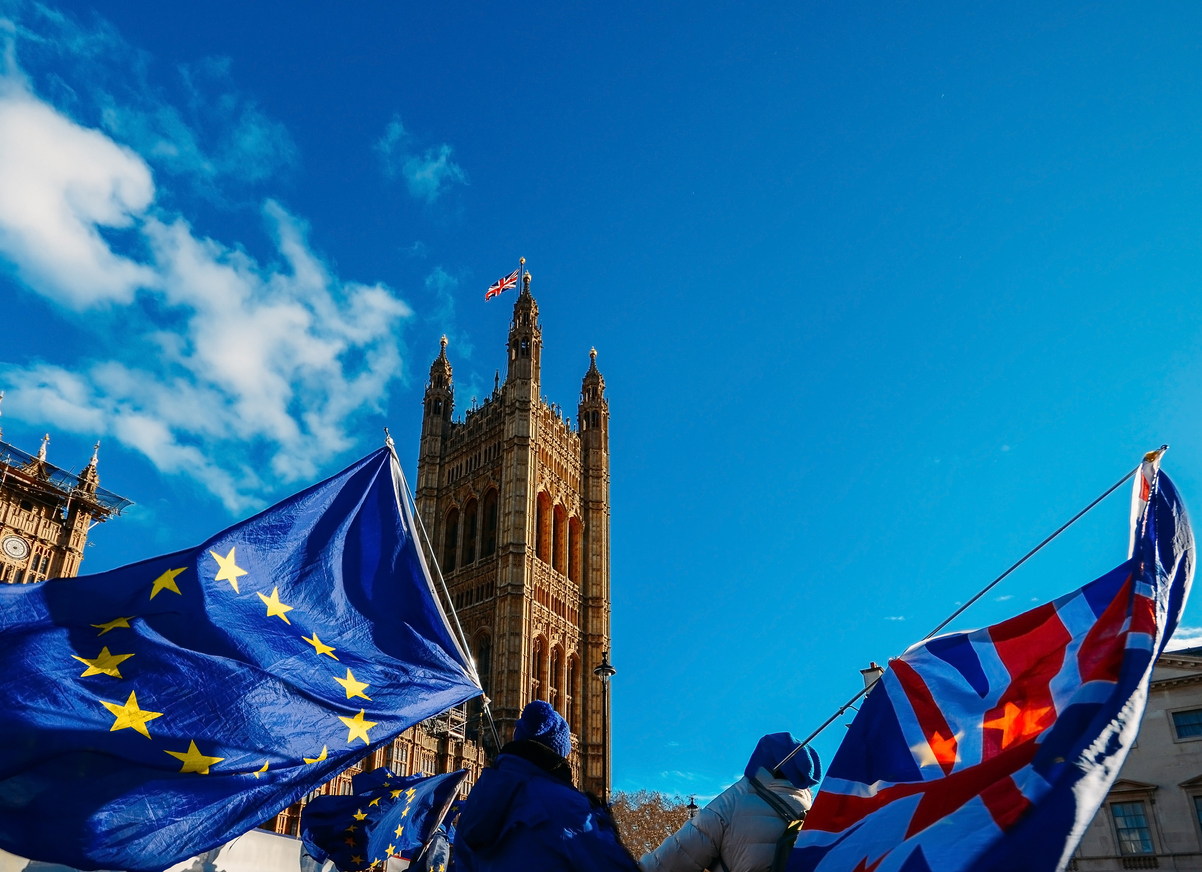The British political establishment is not interested in taking the UK back into the European Union. Rishi Sunak thinks Brexit is going swimmingly; Keir Starmer think Brexit can and should be made to work better; and Ed Davey thinks rejoining the EU is “off the table.”
According to consistent opinion polling, millions of British voters disagree with their political leaders on this subject. Thousands of such voters came to London last Saturday (often from far afield) to register this disagreement at the second National Rejoin March.
The march, organised by Peter Corr, an HGV driver affected by Brexit, culminated in a rally outside the House of Commons. A deliberately diverse range of speakers shared with the marchers their differing reasons for opposing Brexit, be these reasons social, personal, political or economic.
Many of those speaking spoke forcefully of the European opportunities from which they had themselves benefitted, but the next generation could not. A regularly recurring theme of their speeches was a sense of disappointment at the acquiescence in Brexit of those many MPs who privately know the damage being done to the UK by estrangement from Europe.


Among the best -received of the speeches were those by the two MEPs, Guy Verhofstadt and Terry Reintke, by the former MEP Richard Corbett and by the philosopher AC Grayling. Verhofstadt and Reintke stressed that there would always be a welcome for the UK if it wished to return to the European Union. British voters wishing to rejoin the EU should not be discouraged by fear of a hostile reception.
Corbett warned that there were definite electoral dangers as well as hypothetical electoral benefits for politicians who supported Brexit. It was a risk to try to please only those on the pro-Brexit side of the argument. A.C. Grayling reminded his audience that eighty percent of British voters under 25 supported rejoining the EU. In his view, this made eventual British re-entry into the EU inevitable. The only barrier to this re-entry was the ineptitude of the British political class and the populist media that supported it.
At the end of the meeting, the organisers expressed their satisfaction at the success of the event. They had been able to disprove two claims often advanced by supporters of Brexit, namely that the EU does not want the UK back in its ranks; and that hostility to Brexit is confined to a small, unrepresentative elite living in London and South East England. Most importantly, they had been able to show that the reversal of Brexit is a cause that still motivates many members of the British voting public.
Brexit has brought none of the promised economic benefits to the country; it is on the contrary a brake on economic growth; it is making travel and trade between the UK and continental Europe every day more difficult; and it is turning the United Kingdom into a narrower, less tolerant society viewed with suspicion by its neighbours.
Seven years after the EU referendum, its narrow and contentious result has not sufficed to resolve definitively the question of the UK’s relationship with mainland Europe. The persistent and public discontent of Saturday’s marchers is all the more extraordinary given the absence of any encouragement from the British political elite. The referendum result of 2016 sounded the death knell for pro-European sentiment in the Conservative Party; Keir Starmer is concerned to appease the supposed prejudices of the “red wall;” and Ed Davey does not necessarily reflect the views of his party in the tepidity of his pro-European convictions.
Even in the face of this political hostility and indifference, it was nevertheless possible to organise a large and impressive gathering of committed protestors on a Saturday afternoon in London. Those who were marching on Saturday find themselves in ironic agreement with Nigel Farage that an outcome of 52% to 48% in 2016’s referendum represented “unfinished business.”
This “unfinished business” was for many marchers and speakers on Saturday not confined to the reversal of Brexit. Widespread among them was the sense that the current British political system is dysfunctional and that Brexit is a direct consequences of this dysfunctionality. The apparent inability of our political establishment to reverse the obvious error of Brexit gives further ground for concern about the soundness of our present political culture.
One of the small number of political parties associated with Saturday’s march was the Rejoin EU Party, of which I am chair. Our party exists largely as a response to the dysfunctionality of British politics.
When large majorities of British voters now recognise that Brexit was a mistake and want its reversal, it is a democratic anomaly that voters do have so little opportunity at Parliamentary Elections in most of the United Kingdom to express their desire to rejoin the European Union. The Rejoin EU Party gives voters that opportunity. The success of Saturday’s march encourages us to believe that there are many voters who may be inclined to seize that opportunity.
Politics.co.uk is the UK’s leading digital-only political website, providing comprehensive coverage of UK politics. Subscribe to our daily newsletter here.












